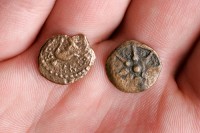
This is my 1000th Post!
If you want to read all 1000, check out the Blog Archives. Ha!
Brief History
Here is a brief history of the Till He Comes blog.
June 19, 2007. The first post on this blog: Welcome to the TILL HE COMES Blog. The website has been in existence since 2001, but this is when I launched the blog. Prior to the blog, I was posting mainly sermons and Bible studies, some of which I am migrating over to my sermon pages.
December 19, 2007. Things went pretty well with the blog for about 5 months. I had a small, but growing readership, in large part due to the traffic I already had through my website, and also due to my work at a Christian non-profit organization and publishing company. I was getting published and speaking in conferences and churches. But on December 19, 2007, I published a post called The Heretic in Me which would change my life forever. I had no idea about the magnitude of the storm that this post would create in my life.
January 17, 2008. Within a month after writing that fateful post, I lost my job and most of my Christian friends. Though I had predicted that some would call me a heretic for the seven ideas I was studying (but had not actually believed), I didn’t actually think that anybody would actually call me a heretic and turn on me. But they did. I can count on one hand the people who did not reject me, criticize me, and condemn me. This is not the worst crisis that a person can face in their life, but it was a crisis for me. I wrote a post about what was going on here: From Crisis to Christless.







 Mites were very small copper coins, which today, would be equivalent to a few pennies. She did not give much at all. And yet, Jesus says that she gave more than all the rich, for they gave out of their wealth, but out of her poverty, she gave her last few coins.
Mites were very small copper coins, which today, would be equivalent to a few pennies. She did not give much at all. And yet, Jesus says that she gave more than all the rich, for they gave out of their wealth, but out of her poverty, she gave her last few coins.


 Jesus didn’t talk a lot about tithing, and when He did, it was usually in a negative context.
Jesus didn’t talk a lot about tithing, and when He did, it was usually in a negative context.


 Frank: In the book, you make several key statements about God’s passion to help the poor. You also make a few statements about how the “powers that be” often neglect the poor. In my country right now (USA) there is a huge debate over this issue among Christians. One aspect of the debate revolves around the question,“Who are the poor exactly?” Some Christians argue that there is a distinction between the poor who are trying to find work and/or who are working (but cannot make ends meet) versus the indigent who refuse to work and expect others to support them.
Frank: In the book, you make several key statements about God’s passion to help the poor. You also make a few statements about how the “powers that be” often neglect the poor. In my country right now (USA) there is a huge debate over this issue among Christians. One aspect of the debate revolves around the question,“Who are the poor exactly?” Some Christians argue that there is a distinction between the poor who are trying to find work and/or who are working (but cannot make ends meet) versus the indigent who refuse to work and expect others to support them. N.T. Wright: Of course, whenever people discover that other folk are going out of their way to give handouts, some will get lazy and simply try to trade off this goodwill. It’s a telling point, actually, that this was already a danger in the very early church – because you only get that problem arising if the church is being generous. The line between ‘deserving poor’ and ‘undeserving poor’ is very, very hard to draw, and one of the things about poverty, whether one has work or not (some jobs pay so little that the people who do them are still well within the poverty trap), is that it is depressing, and actually saps the energy and nerve and vitality in ways that people like me, who have never been out of work and never been truly poor, can only appreciate by being with and ministering to people who are genuinely and chronically poor.
N.T. Wright: Of course, whenever people discover that other folk are going out of their way to give handouts, some will get lazy and simply try to trade off this goodwill. It’s a telling point, actually, that this was already a danger in the very early church – because you only get that problem arising if the church is being generous. The line between ‘deserving poor’ and ‘undeserving poor’ is very, very hard to draw, and one of the things about poverty, whether one has work or not (some jobs pay so little that the people who do them are still well within the poverty trap), is that it is depressing, and actually saps the energy and nerve and vitality in ways that people like me, who have never been out of work and never been truly poor, can only appreciate by being with and ministering to people who are genuinely and chronically poor.


 There is no basis in the Mosaic Law for the
There is no basis in the Mosaic Law for the 